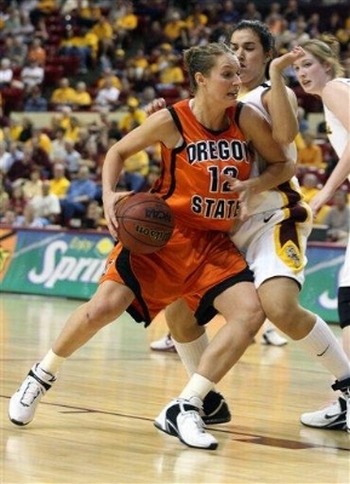
Publisher:
Bonnie King
CONTACT:
Newsroom@Salem-news.com
Advertising:
Adsales@Salem-news.com

~Truth~
~Justice~
~Peace~
TJP
Jul-06-2007 08:10

 TweetFollow @OregonNews
TweetFollow @OregonNews
OSU Researchers Calling for Aggressive Health Screening of Female Athletes
Salem-News.comIn their quest to be lean, female athletes can trigger a hormonal imbalance that leads to poor bones.
 Coaches, doctors and parents need to heed the signs and symptoms of what researchers call the “Female Athlete Triad” – inadequate food intake, menstrual disruption and low bone density. Photo: OSU Athletics |
(CORVALLIS, Ore. ) - Coaches, doctors and parents need to heed the signs and symptoms of what researchers call the “Female Athlete Triad” – inadequate food intake, menstrual disruption and low bone density.
In a paper scheduled for fall publication in the Journal of Sports Science, Oregon State University Professor Melinda Manore and two co-authors – OSU doctoral student Lynn Cialdella Kam and Ohio University Professor Anne B. Loucks – call for comprehensive screening of athletes and active females to detect energy deficits and eating disorders, as well as wider education about a syndrome that too often goes undetected.
In their quest to be lean, female athletes can trigger a hormonal imbalance that leads to poor bones.
The researchers’ goal is to help prevent and treat problems before permanent damage is done.
Manore, a professor of nutrition and exercise in the OSU College of Health and Human Sciences and OSU Extension, presented the paper in April at the International Association of Athletics Federations conference in Monaco.
“Sport governing bodies, including the International Association of Athletics Federations, should consider rule changes that would prevent the development of the ‘triad’ due to unhealthy weight-loss practices,” Manore said.
Research by Manore and her colleagues has shown that girls and women participating in sports, particularly events that emphasize thinness – distance running, gymnastics, dancing, diving and cheerleading among others – run the risk of upsetting hormonal balance and compromising bone health.
Whether athletes restrict food inadvertently or intentionally, severe energy deficits alter levels of hormones regulating metabolism and reproduction.
The results are two-fold, the researchers say: cessation (or delay) of menstruation and reduced bone growth.
Females whose energy intake is much lower than their energy output are in jeopardy, both short-term and long-term, Manore pointed out. They may face fractures today, severe osteoporosis down the road.
Societal pressure to be thin spurs many girls and women toward strenuous dieting and eating disorders, including anorexia and bulimia.
Females in “thin-frame” sports are especially susceptible to dangerous eating behaviors.
It is incumbent upon coaches, medical providers and family members to protect these athletes’ health through knowledge, sensitivity and proactive involvement, Manore said.
“Diagnosis and identification of the triad depends on thorough screening of athletes by their physicians during the pre-participation physical,” Manore and her colleagues write. “It is also imperative that we educate the health professionals working with athletes to be aware of the signs and symptoms of the triad.”
Manore’s research on the Female Athlete Triad, and other studies, are featured in the summer 2007 issue of Terra, OSU’s research magazine.
It can be found online at: OSU Terra Web
Articles for July 5, 2007 | Articles for July 6, 2007 | Articles for July 7, 2007

googlec507860f6901db00.html
Salem-News.com:



Terms of Service | Privacy Policy
All comments and messages are approved by people and self promotional links or unacceptable comments are denied.
[Return to Top]
©2025 Salem-News.com. All opinions expressed in this article are those of the author and do not necessarily reflect those of Salem-News.com.